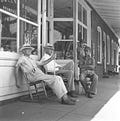Today I am taking a risk. I’ve decided to share a draft of a chapter from an unpublished manuscript. Even though this fragment is incomplete, unfinished, and by no means perfect, it represents the ge…
© 2024 Nojesuittricks
Substack is the home for great culture


